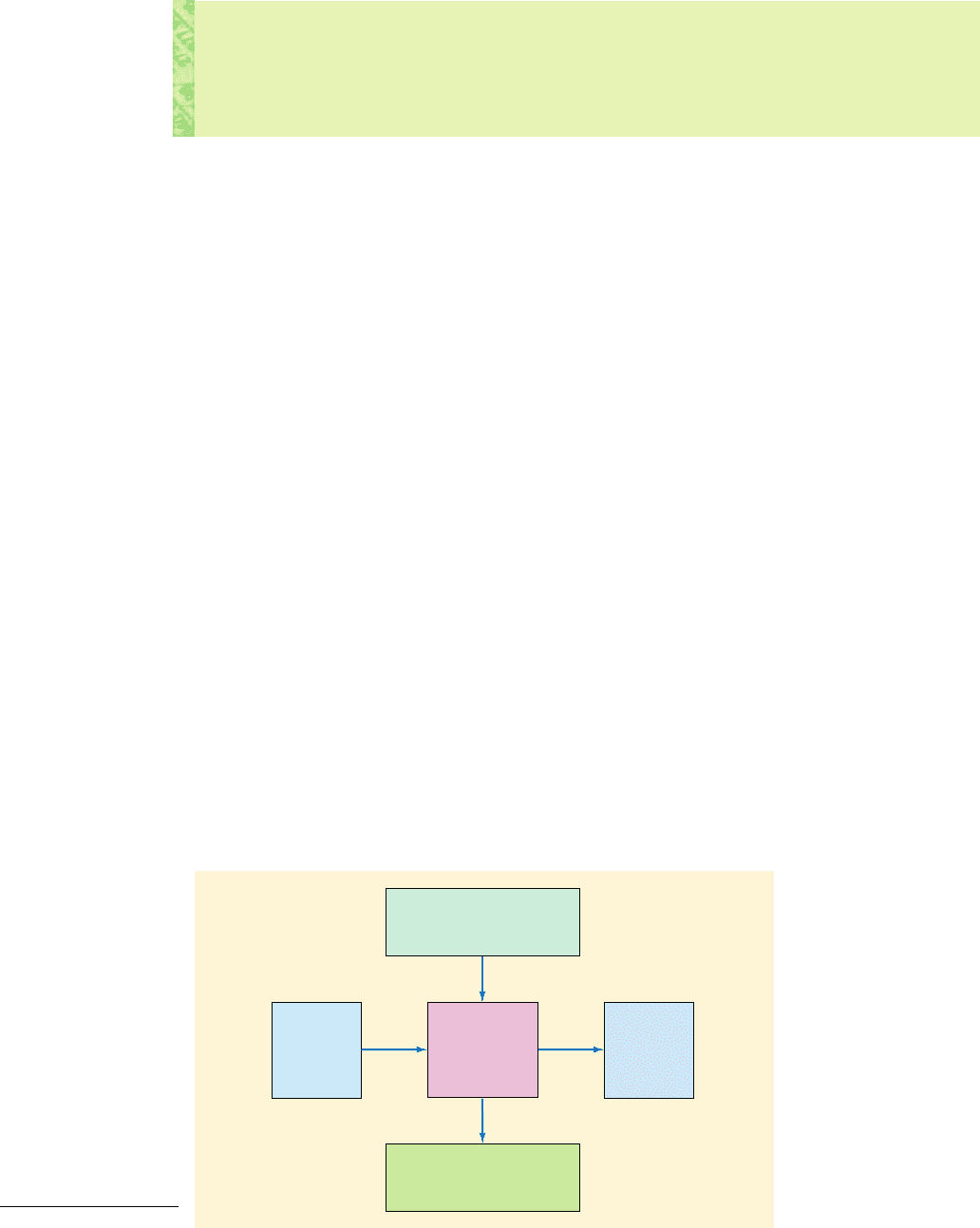Pike Robert, Neal Bill. Corporate finance and investment: decisions and strategy
Подождите немного. Документ загружается.


.
Chapter 16 Long-term finance 425
■
Equity issues by quoted companies
Once a company has achieved a quotation, it will find it easier to raise further equity,
assuming a successful trading and profit record. The commonest method of raising new
equity is by a rights issue (see below). The Companies Act of 1985 gives existing share-
holders the right to subscribe to new share issues in proportion to their existing holdings.
This generally rules out a public issue although these pre-emption rights can be waived
with the agreement of shareholders at a properly convened meeting. With such agree-
ment, a placing may be arranged whereby shares are sold to participating institutions
provided that the price involves no more than a 10 per cent discount to the market price.
Shares can also be issued as full or partial consideration when acquiring another com-
pany. In some cases, this may be done via a vendor placing, or placing with clawback. In a
vendor placing, the acquiring company places the new shares with a group of institutions,
thus diluting the ownership and earnings of existing shareholders. For sufficiently large
issues, existing shareholders have the right to reclaim the shares they would have been
entitled to, had there been a rights issue. If they do not, they receive no compensation for
the loss in value of their holdings as there are no detachable rights to sell (see below).
In view of their importance, we now give detailed consideration to rights issues.
Salaam Alaykum to the AIM
In August 2004, the first fully Islamic British bank, the Islamic Bank of Britain, but with origins in
the tiny desert state of Qatar, was given permission by the FSA to offer a range of consumer
banking products compliant with Sharia, the code of laws that govern Islam. None of its products
would involve the taking or paying of interest, or investing in haram (prohibited) activities such
as alcohol, tobacco or pornography. Depositors in such banks are offered a share in profit from
the bank’s operations (rather like the Cooperative dividend). Formed with £14 million of seed
capital, raised largely from the Qatari royal family and other wealthy Arabian Gulf investors, the
biggest shareholders were the Emir of Qatar, Sheikh Hamad Khalifa bin Hamad al Thani, and the
Qatar International Islamic Bank, both with around 17 per cent of the equity.
Later that month, it announced details of a floatation to raise £40 million by the issuance
of 160 million shares at 25 pence through a combination of a public issue on the AIM market
and a private placing, with existing investors invited to participate to avoid diluting their hold-
ings. This issue price valued the business at £105 million. The proceeds were to be used to
open new branches in London and other cities with large Muslim populations, such as Leicester
and Bradford, and to develop new products such as mortgages by the end of 2004, and an
internet banking service in 2005.
Source: Based on Financial Times, 9 August 2004, and www.ft.com 27 August 2004.
Reversing the flow: Going private again
The years since the stock market slide of 2000/01 have seen an upsurge in the number of firms
being taken off the stock market by so-called private equity firms, generally specialist funds that
are subsidiaries of banks or syndicates set up by a number of banks. Traditionally, they have spe-
cialised in funding management buy-outs or spin-offs of unwanted divisions of larger firms, but
more recently, they have been active in taking quoted firms off the stock market. For example, in
February 2005, one such firm, Apax Partners, made a bid for the high-street retailer Woolworths.
Continued
pre-emption rights
The right for existing share-
holders to be offered newly
issued shares before making
them available to outside
investors
vendor placing/placing
with clawback
A placing of new shares with
financial institutions where
existing investors have the
right to purchase the shares
from the institutions con-
cerned to protect their rights
CFAI_C16.QXD 10/28/05 4:57 PM Page 425

.
426 Part V Strategic financial decisions
■ Rights issues
In a rights issue, shareholders are granted the right to subscribe for shares (or less com-
monly, for other types of security) in proportion to their existing holdings, thus
enabling them to retain their existing share of voting rights. Apart from the control fac-
tor, rights issues have certain other attractions:
1 They are far cheaper than a public share issue. Provided the issue is for less than 10
per cent of the class of capital, there is no need for a prospectus, although a brochure
must still be made available.
2 They may be made at the discretion of the directors without consent of the share-
holders or the Stock Exchange. At one time, a queuing system for all new issues was
operated by the government broker, acting for the Bank of England, in order to
ensure a measured flow of new securities on to the market. Nowadays, lead insti-
tutions are merely requested to notify the Bank in advance of new issues to enable
the Bank to compile a ‘calendar’ of all forthcoming new issues proposed for mil-
lion or more.
3 When stock market prices are generally high, companies have been known to raise
cash through rights issues and to place it on deposit while seeking suitable candi-
dates for acquisition. This gives a high degree of flexibility in timing a bid, i.e. the
cash is already to hand.
4 The finance is guaranteed, either from existing shareholders or from the under-
writers. Existing shareholders are given an incentive either to take up their rights or
to sell them. It is not a sensible option to do nothing: this effectively reduces their
wealth, as shares are typically offered at a discount of about 20 per cent below the
current market price. If, as is usual, they are underwritten, the company is guaran-
teed to receive the cash, although it is embarrassing to have to call upon the under-
writers to fulfill their obligations.
£20
Sometimes, they are set up specifically to acquire one particular firm. Some observers esti-
mated that by the end of 2004, firms controlled by private equity firms accounted for around
a quarter of private sector employment in the UK.
Not being quoted themselves, they do not face the same public scrutiny or continuous pres-
sure to perform. Their aim is to restructure the acquired firm and sell it on, either in a trade sale
or by a refloatation. Some spectacular successes have been achieved with substantial increases
in the value of firms taken private and then refloated a few years later being recorded.
Among the reasons for the rise in the private equity sector are:
■ The weight of regulation and disclosure that listed firms have to bear, for example, the move
to International Reporting Standards in 2005, the ongoing requirements of the Combined
Code, the introduction of the Sarbanes-Oxley Act affecting firms with a US listing, and the
requirement to provide a detailed Operating and Financial Review (OFR). Regarding the
Combined Code, many firms do not see the need to separate the roles of Chairman and
Chief Executive, arguing that it leads to lack of flexibility, which hampers swift and effective
decision-making.
■ Greater liquidity among financial institutions. Many institutions have curtailed their invest-
ment of new money into the stock market, and others have cut back their exposure, creat-
ing vacuums that they have filled by investing in private equity funds.
■ The ability to tolerate higher gearing. With no public scrutiny, the amount of debt that they
can carry is greater than for an equivalent listed firm. Private equity firms tend to concen-
trate on asset-rich firms with solid cash flows, most notably firms in the retail store sector,
which often need a re-vamp. In the case of Woolworth (see above), the target had little by
way of freehold property assets, although its leasehold property was generally on very
attractive sites. Moreover, it was a very strong cash generator.
prospectus
A document setting out the
existing financial situation of a
firm and its future prospects
that is published to accompa-
ny a share issue
CFAI_C16.QXD 10/28/05 4:57 PM Page 426

.
Chapter 16 Long-term finance 427
■
Shareholders’ choices in a rights issue: Grow-up plc
Grow-up plc decides to make a rights issue of one new share for every three held. The
share price prior to the issue is 200p and the new shares are to be offered at 160p. In
practice, rights issues are made at a discount, partly to make them look attractive and
thus encourage shareholders to subscribe, and partly to safeguard against the risk of a
fall in the market price during the offer period. The theoretical ex-rights price (TERP) is
the price at which shares are expected to trade after the rights issue has been completed.
It is calculated below at 190p:
The underwriting controversy
The size of underwriting fees and the allegedly uncompetitive way in which contracts are
awarded has generated considerable controversy. Typically, companies ‘lose’ 2 per cent of the
monies raised from a new share issue in fees. The lead underwriter, usually the merchant bank
handling the issue, takes 0.5 per cent, and the firm’s stockbroker 0.25 per cent, with the
remaining 1.25 per cent split among the institutional sub-underwriters (who are in many cases
shareholders!). Critics of the system argue that costs are higher than they would be if a sys-
tem of open tender applied. Indeed, rights issues which have involved tendering for the sub-
underwriting business have produced lower fees. For example, the construction company
Berkeley plc made a rights issue in 1997 incurring sub-underwriting fees of just 0.2 per cent.
In 1997, the Office of Fair Trading instructed the Monopolies and Mergers Commission
(MMC) to investigate the fee structure and system of awarding sub-underwriting contracts. In
May 1998, the MMC reported that a ‘complex monopoly’ existed in these areas and identified
28 ways in which it could operate against the public interest. Following the final report of the
MMC in 1999, and instructions issued by the Secretary of State for Trade and Industry, the fol-
lowing measures were implemented:
■ Stock Exchange listing rules were amended to instruct firms to explain fully to shareholders
why a share issue is made with less than two-thirds of the sub-underwriting offered for ten-
der.
■ The Bank of England published a ‘best practice’ guide which focused on the use of tendering
for sub-underwriting, and on the circumstances in which deep discounts might be advanta-
geous.
■ The SFA was instructed to remind its members that they should give client firms all infor-
mation necessary to make balanced judgements including the alternatives to underwriting
at standard fees.
Effect of a 1-for-3 rights issue
Before 3 old shares prior to rights issue at 200p each: 600p
1 new share at 160p: 160p
After 4 shares worth: 760p
1 share is therefore worth 190p1760p 42 TERP
The value of the rights is the difference between the pre-rights share price and the
TERP. In the case of Grow-up plc, this is for every existing share
held. This 30p is termed the ’nil paid price of rights’. The first option for shareholders
is to sell their rights, obtaining 10p per share, less any dealing costs. A shareholder
with 3,000 shares in the company would have a holding with market value prior
1200p 190p2 10p
theoretical ex-rights price
(TERP)
The share price that should in
theory be established, other
things being equal, after a
rights issue is completed
nil paid price of rights
The market value of the right
to subscribe for new shares
offered in a rights issue
CFAI_C16.QXD 10/28/05 4:57 PM Page 427

.
428 Part V Strategic financial decisions
to the rights issue of After the issue, the value will fall to
a decline of which is the amount he or she would
receive for the rights sold.
The formula for the TERP is thus:
where base number of shares held (i.e. number of rights required to buy one
share).
In this example, TERP is thus:
Similarly, the value of a
.
In the example, this is:
The nil paid price can be expressed per existing share, (10p) or more usually, per
block of shares required to acquire one new share
,
i.e. the difference
between the TERP and the issue price.
The second option is to subscribe for the new shares by taking up the rights. This
should happen only if the shareholder has the resources to acquire the additional
shares and believes this is the best way to invest such money. Additional reasons for
taking up the rights are the fact that no stamp duty or broker’s commission is payable,
and the desire to maintain one’s existing share of voting power.
A third option is to sell sufficient of the rights to provide the cash to take up the balance.
This option, known as ‘tail-swallowing’, makes sense for shareholders who want to
maintain their existing investment in the company in value terms.
The formula for calculating the number of shares is:
As noted, the nil paid price is the difference between the TERP and the subscription
price, i.e. The number of new shares to which our investor with
3,000 existing shares retains acquisition rights is:
To buy 157 shares at 160p will cost funded from (843/1,000) rights sold at
The total investment is now worth which
(when rounded) is equivalent to the original investment of
The final option is to let the rights lapse by doing nothing. In this case, the company
may sell the new shares in the market and, reimburse the shareholder net of dealing
fees. Alternatively, the issuer may conduct an auction of rights not taken up to avoid
the need to appoint underwriters.
The real message from rights issues is that shareholders cannot expect to receive
something for nothing. The apparent gain from the invitation to purchase new shares
at a discount on the existing price is more illusory than real.
To some, a rights issue may look damaging because the share price (in theory) has
to fall due to the sale of shares at a discount, but again this apparent damage is illusory.
Of course, the EPS, based on the last reported profits, will fall, as there are more shares
in issue. But if people are bullish about the firm’s prospects then the post-issue price
may exceed the TERP (and vice versa). In this case, the market would be pricing in the
£6,000.
13,157 190p2 £5,998,30p £252.90.
£251.20,
30p
190p
1,000 157 shares
1190p 160p2 30p.
Nil paid price
Ex-rights price
Number of shares allotted
13 10p 30p2
1190p 160p2 30p
right 1TERP issue price2
13 200p2 160p
13 12
760p
4
190p
N the
TERP
1N cum rights price2 issue price
N l
£300,1£3,000 £1.902 £5,700,
13,000 £22 £6,000.
CFAI_C16.QXD 10/28/05 4:57 PM Page 428

.
Chapter 16 Long-term finance 429
expected returns from new investment, i.e. adding in the NPV of the new project (and
v.v.). In effect, investors are saying that the cash raised is worth more than its nominal
value as it brings with it the promise of positive investment returns (and v.v.); similar-
ly, if the post-issue price is equal to the TERP, investors are assessing the NPV of the
investment project at zero.
■ Open offers
An open offer, or ‘entitlement offer’, may also be made by a quoted company to its
existing shareholders. Like a rights issue, it invites shareholders to buy new shares at a
specified price, normally lower than the going market price. The investor’s entitlement
to buy is also based on his/her existing holdings. However, there is one important dif-
ference – an open offer cannot be traded on the market – if the offer is not taken up it
lapses. An additional difference is that the firm may invite investors to apply for more
than their strict entitlement – a so-called ‘excess application’, although there is no guar-
antee that this excess will be satisfied, as demand for shares may exceed the amount the
firm wishes to issue.
An open offer was made by Corus plc in November 2003 to raise money to finance
its ongoing restructuring programme. New ordinary shares were offered at 23.5p, a 10
per cent discount to the market price, on the basis of five new shares for 12 existing
ordinary shares, although no excess application was offered. The offer was well
received as the supporting information was extensive and convincing, and the Corus
shares began a long bull run.
Self-assessment activity 16.3
What is the TERP in the following case?
■ pre-announcement share price £5.
■ rights issue of 1-for-6 at £3.50 issue price
(Answer in Appendix A at the back of the book)
Powering ahead
International Power plc, the electricity firm formed out of the privatisation of the UK power
generation industry, announced its first ever rights issue on 30 July 2004, when its opening
share price was 143p. The funds involved, about £290 million net of issue expenses, were
intended to help finance two acquisitions with ‘the potential to improve shareholder returns,
and enhance the quality of International Power’s earnings from income that is largely con-
tracted.’ One acquisition was the purchase from RWE Power AG of Germany of a 75% stake in
the 990MW combined cycle gas turbine Turbogas power station in Portugal for Euros 205 mil-
lion in order to strengthen IP’s position in the Iberian market. The other was the acquisition, in
a 70/30 partnership with Mitsui of Japan, of a portfolio of 13 power generation projects, locat-
ed in 9 different countries, 11 of which were operating under long-term power contracts. IP’s
investment in the joint venture amounted to US$677 million.
IP offered existing shareholders 33 new shares per 100 existing ordinary shares at a price of
82 pence, representing a 43% discount to the closing price of 143p on the day prior to the
announcement. The news of the issue and the intended use of the funds pushed the share
price up 3% to 147.5p. By the ex-rights day, the share price stood at 144.25. On the first day
Continued
CFAI_C16.QXD 10/28/05 4:57 PM Page 429

.
430 Part V Strategic financial decisions
■ Scrip issues and bonus issues
Whereas a rights issue raises new finance, a scrip issue simply gives shareholders more
shares in proportion to their existing holdings. As a result, the value of their total hold-
ings is unchanged, but the share price will fall due to earnings dilution. Scrip issues are
often used by companies whose unit share price is ‘high’ – a high or ‘heavyweight’
share price (usually or above) is regarded as a deterrent to trading. This was the rea-
son given by the airport operator, BAA plc, in 1994, when it made a ‘one-for-one’ scrip
issue. For every share held, owners were given a free share. According to BAA, ‘this
will improve the marketability of the company’s shares as the increased number of
shares in issue should result in a corresponding reduction in share price’.
Companies like BAA have built up substantial reserves by retention of earnings,
making their issued share capital look relatively small. In the case of BAA, the issued
share capital was million and the revenue reserve was million. The effect
of the scrip issue was to double the issued share capital and to reduce the revenue
reserve by million to million. In other words, BAA converted, or ‘capi-
talised’, its reserves into issued share capital, hence the common use of the synonym
‘capitalisation issue’.
Scrip issues do not always involve such a drastic reorganisation of shareholder
funds. They are often given as ‘bonus issues’ in addition to cash dividends, and are
often taken by the market as a signal of higher future dividends. If a company makes,
say, a one-for-ten scrip and maintains the dividend per share, this is tantamount to a
future increase in dividends of 10 per cent (the new shares do not normally qualify for
the dividend immediately). This signifies the company’s expectation of greater capac-
ity to pay dividends in the future, i.e. higher future earnings. In such cases, the share
price may not fall quite so far as the simple arithmetic may suggest, i.e. by 1/11th, but
may even increase as the market responds to the ‘signals’ emitted by the company.
■ Share splits (‘stock splits’ in the USA)
An alternative way of addressing the heavyweight status of a share is to split the ordi-
nary shares into a larger number with lower par value. For example, one additional
share may be given for every existing share in a ‘2-for-1’ split. In theory, this has no
effect on the accounting numbers, i.e. the book value of the share capital. Nor should it
affect the share price since no additional funds are raised and each shareholder’s inter-
est in future profits is unchanged.
Microsoft Inc. has made nine stock splits since its IPO in March 1986, the most
recent being in February 2003, as shown in Table 16.1, when 5.4 billion shares were
multiplied into a total of 10.8 billion in a 2-for-1 split.
£837£511
£1,348£511
£10
of trading ex-rights, when investors could begin to trade the rights separately from the shares
themselves, the shares opened at 136p, but receded to close at 131p. The nil paid rights price
opened at 53p, but fell back to 48p, in line with the ordinary share price.
The theoretical ex-rights price (TERP), based on the share price ruling just prior to
announcement was:
100 shares @ 143p £143.00
Cash: 33 shares @ 82p £27.06
Total £170.36
TERP (£170.06/133 shares) 128p
With the market price above the TERP, this suggested people viewed the issue favourably,
(although the market as a whole had risen over this period).
Source: Circular sent to International Power shareholders, August 2004 (Details used with permission).
CFAI_C16.QXD 10/28/05 4:57 PM Page 430

.
Chapter 16 Long-term finance 431
Table 16.1
History of Microsoft
common stock splits
Split Payable date Type of split Closing price before/after
First Sept. 18, 1987 2 for 1 Sept. 18–$114.50/
Sept. 21–$53.50
Second April 12, 1990 2 for 1 April 12–$120.75/
April 16–$60.75
Third June 26, 1991 3 for 2 June 26–$100.75/
June 27–$68.00
Fourth June 12, 1992 3 for 2 June 12–$112.50/
June 15–$75.75
Fifth May 20, 1994 2 for 1 May 20–$97.75/
May 23–$50.63
Sixth Dec. 6, 1996 2 for 1 Dec. 6–$152.875/
Dec. 9–$81.75
Seventh Feb. 20, 1998 2 for 1 Feb. 20–$155.13/
Feb. 23–$81.63
Eighth March 26, 1999 2 for 1 March 26–$178.13/
March 29–$92.38
Ninth Feb. 14, 2003 2 for 1 Feb. 14–$48.30
Feb. 18–$24.96
Source: www.microsoft.com
Self-assessment activity 16.4
In a share split, e.g. ‘2-for-1’, what is the effect on:
■ the number of shares issued?
■ the shareholders’ capital in the balance sheet?
■ the firm’s assets?
■ its market value – per share? in total?
(Answer in Appendix A at the back of the book)
Equity capital: checklist of key features
For
■ No fixed charges (e.g. interest payments). Dividends are paid if the company generates suf-
ficient cash, the level being decided by the directors.
■ No repayment is required. It is truly permanent capital.
■ In the case of retained profits and rights issues, directors have greater control over the
amount and timing, with minimal paperwork or issuing costs.
■ It carries a higher return than loan finance and acts as a better hedge against inflation for
investors.
■ Shares in most listed companies can be easily disposed of at a fair value.
Against
■ Issuing equity finance can be cost-effective (as in the case of retained profits or a rights
issue), but it is expensive in the case of a public issue (often 5 per cent or more of the
finance raised).
■ Issuing ordinary shares to new shareholders dilutes the degree of control of existing members.
■ Dividends are not tax-deductible, making equity relatively more expensive than borrowing.
■ A higher proportion of equity can increase the overall cost of capital for the company (see
Chapter 18).
■ Shares in unlisted companies are difficult both to value and to dispose of.
CFAI_C16.QXD 10/28/05 4:57 PM Page 431

.
432 Part V Strategic financial decisions
16.6 DEBT INSTRUMENTS: DEBENTURES, BONDS AND NOTES
The array of instruments for raising debt finance is even greater than for equity finance.
Firms can raise long-term debt via the banking system, e.g. by a term-loan, or via the
money and bond markets, by issuing a security that can be traded rather than held to
maturity. The money markets supply short-term borrowing while the bond markets
supply medium-to-long term finance.
The word ‘bond’ is a general term used to describe a variety of longer-term loans to
companies. In some markets, they are described as ‘loan stock’, or, especially where
the interest payable is variable, as ’notes’. A bond is simply a receipt or promise to
repay money on a loan, usually with interest i.e. it binds the borrower to a commit-
ment that can range between one and 30 years.
Characteristics of a bond are:
■ the nominal or par value in the currency of denomination.
■ the redemption value – usually the par value, but other possibilities include a stat-
ed premium or index-linking.
■ the rate of interest payable – known as the coupon – expressed as a percentage of
the nominal value.
■ the redemption date.
For example, BAA plc, the UK airports operator, is committed to the following bond:
BAA plc 7.875% 2007 million
The million will be repaid in full in 2007; and interest is payable per
of stock each year in two stages.
■ Debentures
In strict legal terms, a debenture is a document acknowledging that the firm has bor-
rowed money, whether or not any security has been given to back the loan. However, in
normal business usage, this term is used to describe a loan which is secured on the assets
of the company by mortgage deeds – a secured debenture is often called a mortgage
debenture. If the issuer goes into liquidation, or defaults on interest or capital payments,
the holders can apply for a court ruling to order the sale of either specified assets (called
a fixed charge) or any of the firm’s assets (a floating charge). The firm cannot dispose
of assets subject to a fixed charge without the permission of the creditors.
As regards priority for payment, debts rank in order of issue – holders of the earli-
est issued debentures must be paid interest before the later comers. Where a firm has
issued a series of bonds, a pari passu clause is inserted into the document acknowl-
edging the debt. Debentures that rank lower down the priority list are called ‘junior’
or ‘subordinated’ stock.
The BAA stock referred to above is unsecured, and thus ranks behind its secured bor-
rowing, but ahead of a number of subsequently-issued unsecured bonds. Unsecured
stock is riskier than secured stock and investors thus require a higher coupon rate.
The pejorative term ‘junk bond’ is applied to the unsecured loan stock of a bor-
rower that merits sub-investment grade by a bond-rating agency. Standard & Poor’s
investment grade is BBB or above – any security rated below this ‘is regarded as hav-
ing predominantly speculative characteristics with respect to capacity to pay interest
and repay principal’. Obviously, junk carries much higher than average yields, hence
the euphemism ‘high yield bonds’.
Loan agreements usually specify restrictive covenants. Such conditions might include
the following:
1 Dividend restrictions – limitations on the level of dividends a company is permitted
to pay. This is designed to prevent excessive dividend payments, which may
£100
£7.875£200
£200
notes
Loan securities in general, but
often referred to securities
that carry a floating rate of
interest
restrictive covenants
Limitations on managerial
freedom of action, stipulated
as conditions of making a loan
mortgage debenture
A loan instrument under which
the ownership of selected
assets is mortgaged to the
lender – in a default, the title
passes to the lender
CFAI_C16.QXD 10/28/05 4:57 PM Page 432

.
Chapter 16 Long-term finance 433
seriously weaken the company’s future cash flows and thereby place the lender at
greater risk.
2 Financial ratios – specified levels below which certain ratios may not fall, e.g. debt-
to-net-assets ratio, current ratio.
3 Financial reports – regular accounts and financial reports to be provided to the lender
to monitor progress.
4 Issue of further debt – the amount and type of debt that can be issued may be restrict-
ed. Subordinated loan stock (i.e. stock ranking below the existing unsecured loan
stock) can usually still be issued.
5 Asset backing – a specified minimum level of tangible fixed assets.
Debentures and unsecured loan stock: checklist of key features
For
■ Most corporate loan stocks give ten or more years before repayment is due. A ‘bullet’ loan is
where there is just one final repayment, and a ‘balloon’ loan is where increasing amounts of
capital are repaid towards the end of the period of the loan. Bullet and balloon loans give
attractive cash flow benefits in the early years, where little or no interest is payable.
■ A successful company may eventually be able to redeem the loan stock through a new
issue, without drawing upon operating cash flows (although the company is exposed to the
risk of higher interest rates).
■ Interest is tax-deductible.
Against
■ Restrictions are placed on the company in terms of either the charge over assets or the
restrictive covenants imposed.
■ Unsecured loan stock may impose demanding performance requirements.
■ Greater monitoring and control takes place over a public issue such as a debenture than
with, say, a term loan with a bank.
■ Deep-discount bonds
Some debt instruments are sold at a price well below the par value, with a so-called
deep-discount. An extreme case of this is Zero-coupon bonds, e.g. a bond issued at
with a five-year life to maturity when it will be repaid at par of Such bonds carry
no entitlement to interest as such, thus appealing to investors who would normally pay
Income or Corporation Tax on interest income, but who may not be liable to Capital
Gains Tax, or who wish to defer it. In this example, the annualised rate of return from
the capital gain if held to maturity for the full five years is represented by the rate r in
the following compound interest expression:
This can be written as:
The discount tables (PVIF) can be used to find r (about 10.75 per cent p.a.).
1
11 r2
5
£70
£100
0.700
£7011 r2
5
£100
£100.
£70
CFAI_C16.QXD 10/28/05 4:57 PM Page 433

.
434 Part V Strategic financial decisions
Self-assessment activity 16.5
What is the yield to maturity on a zero-coupon bond issued at £50, repayable at par of
£100, in ten years’ time?
(Answer in Appendix A at the back of the book)
■ Asset-Backed Securities (ABSs)
In recent years, some companies – and even certain individuals – have issued a new
breed of securities, backed not by physical assets but by a reliable long-term stream of
future earnings. A category of assets commonly utilised has been intellectual property
represented by patents and copyrights. Like most security issues, ABSs are sold essen-
tially to raise cash for investing in other activities.
Organisations effectively capitalise their future income into a single lump sum and
sell it on the financial markets to generate immediate cash. The firm’s financial advis-
ers set up a Special Purpose Vehicle (SPV), as shown in Figure 16.1. This is effectively
a ‘bank’ which handles the bond issue and into which the designated income stream
is paid and from which is paid the stream of interest payments needed to service the
borrowing.
This process of converting non-tradable claims into tradable ones is called securiti-
sation. Like most financial innovations, securitisation originated in the USA. Banks
parcelled up mortgage commitments made by house purchasers into bundles of mort-
gages to sell as interest-bearing securities, originally known as collateralised mortgage
obligations (CMOs). Having both liquidity and a bank’s guarantee, these could be
offered at a lower interest rate than that charged on the underlying mortgages, the dif-
ference representing profit for the bank. This practice is now widespread in Europe,
where it is increasingly seen as a cheaper alternative to unsecured bond issues.
The following examples of the ABS principle (not all of which involved SPVs) demon-
strate its flexibility and versatility:
■ In 1992, the Disney Corporation issued $400 million in seven-year notes with a vari-
able rate of interest to be paid from royalties receivable from its portfolio of film
copyrights, a path followed also by News Corporation in 1996.
■ In 1997, David Bowie raised $55 million by selling bonds backed by his music copy-
right portfolio, with an average bond life of ten years. This tactic was also adopted
by Rod Stewart and Michael Jackson, using similar security.
Income from
specified asset
e.g. recording royalties
Interest and
principal paid to
investors
Capital
raised
for
originator
Proceeds
of
sale of
bonds
SPECIAL
PURPOSE
VEHICLE
Figure 16.1
How an SPV works
Special Purpose Vehicle
(SPV)
A financial vehicle set up to
manage the issue of Asset-
Based Securities and arrange
for payment of interest and
eventual redemption
CFAI_C16.QXD 10/28/05 4:57 PM Page 434
